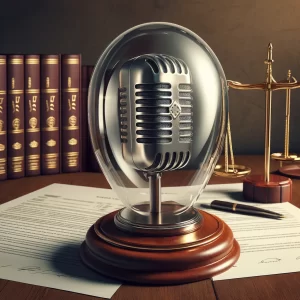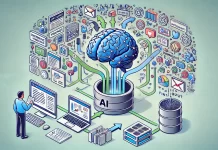If you listen to this song, it is easy to think that the song was made by Drake, but the truth is it wasn’t. That, was an AI generated song, uploaded a few months ago, and has since raised some important questions. How can we prevent AI from using Artist voices without their permission?
This was attempted to be addressed on March 21, 2024 by Tennessee State (in the United States). The state has enacted a new law, titled the Ensuring Likeness Voice and Image Security Act of 2024 (“Elvis Act”). The Elvis Act replaces the Personal Rights Protection Act of 1984 (“Personal Rights Act”).
The Personal Rights Act was passed, in part, to extend Elvis Presley‘s publicity rights after the “King of Rock and Roll” had passed away, because at that time Tennessee did not recognize posthumous publicity rights.[i]
The Personal Rights Act previously prohibited unauthorized commercial use of an individual’s name, photograph, and likeness. The Elvis Act has expanded the publicity right by adding voice as a protectable element. This poses a great risk to artificial intelligence services, and other platforms on the internet, that enable the use of voice and likenesses of artists without their permission.
Key Provisions
The Elvis Act amends the previously existing Personal Rights Act in two major ways:
- It expands the existing law by adding an individual’s “voice” as a prohibited component, in addition to the prohibition on unauthorized commercial use of an individual’s name, photograph and likeness.
According to the Elvis Act, “voice” means and includes “a sound in a medium that is readily identifiable and attributable to a particular individual, regardless of whether the sound contains the actual voice or a simulation of the voice of the individual.”
Interestingly, this definition may expand the liability under the ELVIS Act not only to use of existing sound recordings of someone’s voice (for example, using The Weeknd’s vocals from “The Hills” to create another AI song, using his voice), but also to humans who can imitate other artists (for example, soundalike artists who imitate voices of celebrities).[ii]
- It has also introduced a new form of secondary liability relevant for AI companies. Under Section 6[iii] of the amendment act (Section 47-25-1105), the law now would introduce two forms of civil liability; where a person or company:
Clause (a)(2)
“Publishes, performs, distributes, transmits, or otherwise makes available to the public an individual’s voice or likeness, with knowledge that use of the voice or likeness was not authorized by the individual”
This means that any platform such as social media sites or streaming services that make available any unpermitted voice of any individual, knowing it to be so, may face legal action.
OR
Clause (a)(3)
“Distributes, transmits, or otherwise makes available an algorithm, software, tool, or other technology, service, or device, the primary purpose or function of which is the production of an individual’s photograph, voice, or likeness without authorization from the individual.”
This potentially aims at Artificial Intelligence companies that make available services or technology whose primary function is to produce such voices or photographs that are unauthorized.
Such as, where a deepfake application allows creating songs based on the voice of any particular Artist, without his permission. In such cases, the developers may face civil action, because they facilitated unauthorized use of personality rights of individuals.
Interestingly, for these two clauses, it is not necessary that the unauthorized act is for commercial use. For example, if a person made a song using deepfake voice for non-commercial purposes, such as making a short non-commercial video, the person may become liable under the provisions of the Elvis Act.
Therefore, AI companies have more to worry about, because now they may be liable for a very wide range of unauthorized activities.
Penal Actions
The ELVIS Act provides for remedies such as injunction, impounding, and damages. These remedies are similar to the Personal Rights Act.
Any person whose right was infringed can seek injunctive relief to stop the unauthorized use of their name, photograph, voice, or likeness. Also, he can seek impounding or destruction of all materials made or used that were in violation of their publicity rights, and they may recover actual damages, and any additional profits attributable to that infringement.
Who can sue?
An interesting change in the Elvis Act is that it broadens the scope of enforcement, allowing record companies to bring an action on behalf of their recording artist.
The introduced provision says that: “Where a person has entered into a contract for an individual’s exclusive personal services as a recording artist or an exclusive license to distribute sound recordings that capture an individual’s audio performances, an action to enforce the rights set forth in this part may be brought by the person or the individual.”
It therefore clarifies that where, for example, a Record Label may have entered into an exclusive recording artist contract, or was granted an exclusive license for distributing sound recordings featuring an Artist’s voice, either the Artist or the Record Label can enforce the relevant publicity rights.
Analysis
In India, the voice of celebrities are protected under personality rights. There is therefore definitely a legal basis and reason to enact regulation for protecting misuse of voices of celebrities and artists, and holding such artificial intelligence companies liable who gain from providing software that enable such misuse.
Voice as a part of personality rights was recently recognised in the case of Amitabh Bachchan v. Rajat Nagi,[iv] the Delhi High Court passed an injunction effectively restraining the world at large (‘John Doe’ defendants) from infringing Mr. Amitabh Bachchan’s publicity or personality rights by misuse of his name, likeness, photograph, voice and any other attributes which is exclusively identifiable with him, for any commercial gain.
The issue of deepfakes was also recently flagged in Anil Kapoor vs Simply Life and Others.[v] Certain defendants were found to be misappropriating Mr. Anil Kapoor’s personality rights by, inter alia, using generative artificial intelligence to superimpose his face on other famous actors’ bodies and creating derogatory images. The Delhi High Court granted interim relief to Mr. Anil Kapoor for protection of his name, likeness, voice, persona, and other attributes of his personality against unauthorized commercial use.
Conclusion
The broad definition of voice provided in the Elvis Act is instrumental in addressing the potential loopholes that could otherwise be exploited, that is using someone’s voice through the use of voice actors. By encompassing a wide range of scenarios, this clarification ensures a more comprehensive protection of artists’ rights, leaving less room for circumvention of the law.
Overall, the Elvis Act is a positive step. It’s tackling a real problem where fake songs and videos being published all over the place without permission from the represented artists.
However, the exceptions in the Elvis Act may raise valid concerns. Notably, the potential conflict with free speech provisions in the United States, and the imposition of liability even for non-commercial uses, may pose challenges. Striking a balance between protecting artists’ rights and preserving freedom of speech will be crucial.
[i] https://www.billboard.com/business/legal/tennessee-elvis-act-protecting-artists-voices-ai-impersonation-1235637934/
[ii] https://www.lw.com/admin/upload/SiteAttachments/The-ELVIS-Act-Tennessee-Shakes-Up-Its-Right-of-Publicity-Law-and-Takes-On-Generative-AI.pdf
[iii] https://chatgptiseatingtheworld.com/wp-content/uploads/2024/03/ELVIS-Act-TEXT-HB2091.pdf
[iv] C.S. (Comm.) 819 of 2022 dated November 25, 2022
[v] CS (COMM) 652/2023
Image generated on Dall-E


















